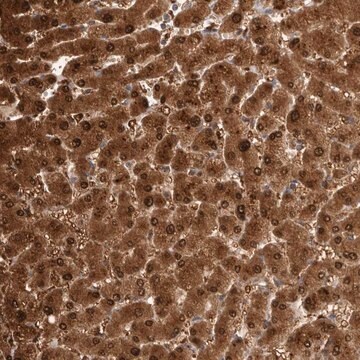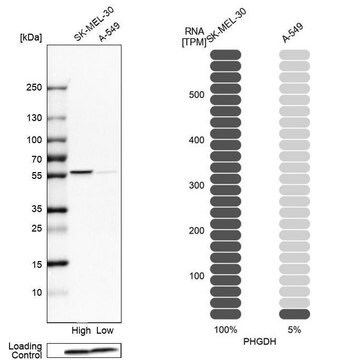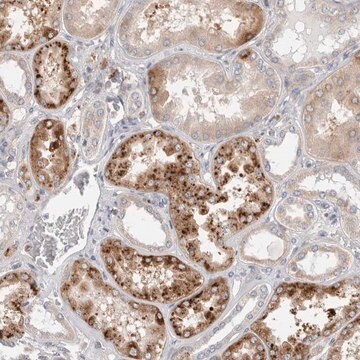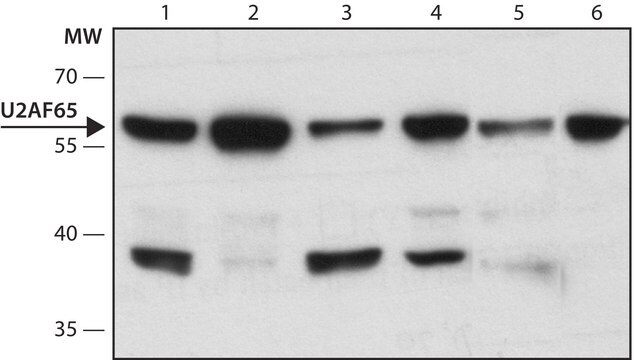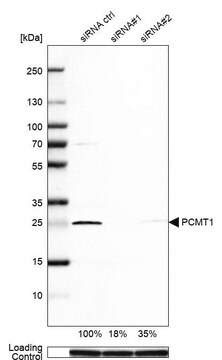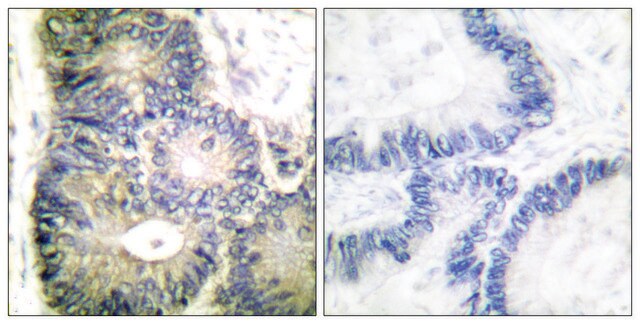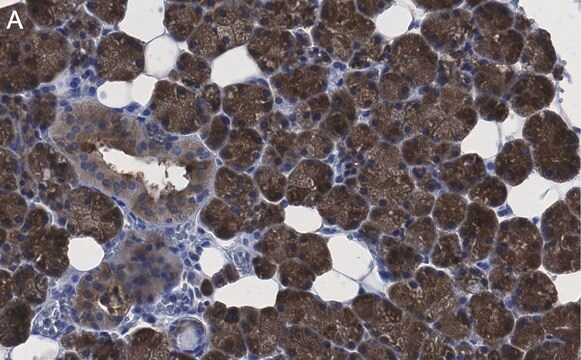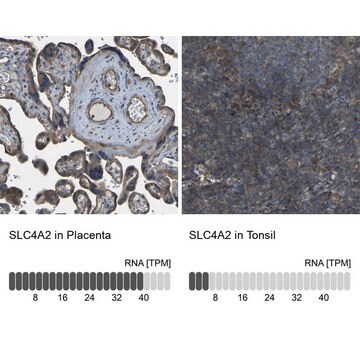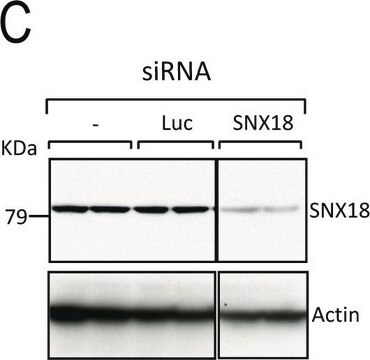추천 제품
생물학적 소스
rabbit
결합
unconjugated
항체 형태
affinity isolated antibody
항체 생산 유형
primary antibodies
클론
polyclonal
제품 라인
Prestige Antibodies® Powered by Atlas Antibodies
양식
buffered aqueous glycerol solution
종 반응성
human
향상된 검증
orthogonal RNAseq
Learn more about Antibody Enhanced Validation
기술
immunoblotting: 0.04-0.4 μg/mL
immunofluorescence: 0.25-2 μg/mL
immunohistochemistry: 1:50-1:200
면역원 서열
GSISRNQGLRLIFTDGSRIVFRLSGTGSAGATIRLYIDSYEKDVAKINQDPQVMLAPLISIALKVSQLQERTGRTAPT
UniProt 수납 번호
배송 상태
wet ice
저장 온도
−20°C
타겟 번역 후 변형
unmodified
유전자 정보
human ... PGM1(5236)
일반 설명
The gene PGM1 (phosphoglucomutase 1) is mapped to human chromosome 1p31. It belongs to the phosphohexose mutase family of proteins.
면역원
Phosphoglucomutase-1 recombinant protein epitope signature tag (PrEST)
애플리케이션
All Prestige Antibodies Powered by Atlas Antibodies are developed and validated by the Human Protein Atlas (HPA) project and as a result, are supported by the most extensive characterization in the industry.
The Human Protein Atlas project can be subdivided into three efforts: Human Tissue Atlas, Cancer Atlas, and Human Cell Atlas. The antibodies that have been generated in support of the Tissue and Cancer Atlas projects have been tested by immunohistochemistry against hundreds of normal and disease tissues and through the recent efforts of the Human Cell Atlas project, many have been characterized by immunofluorescence to map the human proteome not only at the tissue level but now at the subcellular level. These images and the collection of this vast data set can be viewed on the Human Protein Atlas (HPA) site by clicking on the Image Gallery link. We also provide Prestige Antibodies® protocols and other useful information.
The Human Protein Atlas project can be subdivided into three efforts: Human Tissue Atlas, Cancer Atlas, and Human Cell Atlas. The antibodies that have been generated in support of the Tissue and Cancer Atlas projects have been tested by immunohistochemistry against hundreds of normal and disease tissues and through the recent efforts of the Human Cell Atlas project, many have been characterized by immunofluorescence to map the human proteome not only at the tissue level but now at the subcellular level. These images and the collection of this vast data set can be viewed on the Human Protein Atlas (HPA) site by clicking on the Image Gallery link. We also provide Prestige Antibodies® protocols and other useful information.
생화학적/생리학적 작용
PGM1 (phosphoglucomutase 1) plays a crucial role in glucose homeostasis and is responsible for regulating the switch between glycolysis and gluconeogenesis. It is mainly involved in the reversible conversion of glucose 1-phosphate and glucose 6-phosphate. It also participates in protein N-glycosylation. Deficiency of PGM1 has been associated with metabolic disorders, such as hepatopathy, dilated cardiomyopathy and exercise intolerance.
특징 및 장점
Prestige Antibodies® are highly characterized and extensively validated antibodies with the added benefit of all available characterization data for each target being accessible via the Human Protein Atlas portal linked just below the product name at the top of this page. The uniqueness and low cross-reactivity of the Prestige Antibodies® to other proteins are due to a thorough selection of antigen regions, affinity purification, and stringent selection. Prestige antigen controls are available for every corresponding Prestige Antibody and can be found in the linkage section.
Every Prestige Antibody is tested in the following ways:
Every Prestige Antibody is tested in the following ways:
- IHC tissue array of 44 normal human tissues and 20 of the most common cancer type tissues.
- Protein array of 364 human recombinant protein fragments.
결합
Corresponding Antigen APREST76539
물리적 형태
Solution in phosphate-buffered saline, pH 7.2, containing 40% glycerol and 0.02% sodium azide
법적 정보
Prestige Antibodies is a registered trademark of Merck KGaA, Darmstadt, Germany
면책조항
Unless otherwise stated in our catalog or other company documentation accompanying the product(s), our products are intended for research use only and are not to be used for any other purpose, which includes but is not limited to, unauthorized commercial uses, in vitro diagnostic uses, ex vivo or in vivo therapeutic uses or any type of consumption or application to humans or animals.
적합한 제품을 찾을 수 없으신가요?
당사의 제품 선택기 도구.을(를) 시도해 보세요.
Storage Class Code
10 - Combustible liquids
WGK
WGK 1
Flash Point (°F)
Not applicable
Flash Point (°C)
Not applicable
가장 최신 버전 중 하나를 선택하세요:
Bijina Balakrishnan et al.
Journal of inherited metabolic disease, 42(5), 998-1007 (2019-05-12)
Patients with phosphoglucomutase (PGM1) deficiency, a congenital disorder of glycosylation (CDG) suffer from multiple disease phenotypes. Midline cleft defects are present at birth. Overtime, additional clinical phenotypes, which include severe hypoglycemia, hepatopathy, growth retardation, hormonal deficiencies, hemostatic anomalies, frequently lethal
Eunju Bae et al.
FEBS letters, 588(17), 3074-3080 (2014-06-22)
Phosphoglucomutase (PGM)1 catalyzes the reversible conversion reaction between glucose-1-phosphate (G-1-P) and glucose-6-phosphate (G-6-P). Although both G-1-P and G-6-P are important intermediates for glucose and glycogen metabolism, the biological roles and regulatory mechanisms of PGM1 are largely unknown. In this study
Naheed A Rana et al.
Human molecular genetics, 13(24), 3089-3102 (2004-10-29)
The distribution of linkage disequilibrium (LD) in the human genome has important consequences for the design of experiments that infer susceptibility genes for complex disease using association studies. Recent studies have shown a non-random distribution of human meiotic recombination associated
Yingying Lee et al.
The Journal of biological chemistry, 289(46), 32010-32019 (2014-10-08)
Recent studies have identified phosphoglucomutase 1 (PGM1) deficiency as an inherited metabolic disorder in humans. Affected patients show multiple disease phenotypes, including dilated cardiomyopathy, exercise intolerance, and hepatopathy, reflecting the central role of the enzyme in glucose metabolism. We present
자사의 과학자팀은 생명 과학, 재료 과학, 화학 합성, 크로마토그래피, 분석 및 기타 많은 영역을 포함한 모든 과학 분야에 경험이 있습니다..
고객지원팀으로 연락바랍니다.
